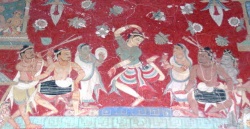Difference between revisions of "Dancing"
(Created page with "thumb|250px| Dancing (nacca) is movements of the body, particularly the feet, meant to express happiness and usually done to the accompaniment of music. A...") |
|||
| Line 1: | Line 1: | ||
[[File:Dancing.jpg|thumb|250px|]] | [[File:Dancing.jpg|thumb|250px|]] | ||
| − | Dancing (nacca) is movements of the body, particularly the feet, meant to express happiness and usually done to the accompaniment of music. At the time of the Buddha, dance had not yet developed into an art and was most often associated with marriage, harvest festivals, drunkenness, sexual license or war. In the southern districts of the Middle Land there were religious ceremonies that included a great deal of singing, dancing, music and feasting (A.V,216). The Buddha disapproved of such dancing, saying that from the point of view of the monastic discipline it was a type of stupidity (A.I,261). One of the eight Precepts that devout Buddhists will try to observe at least four times a month is abstention from dancing (A.IV,250). | + | [[Dancing]] (nacca) is movements of the [[body]], particularly the feet, meant to express [[happiness]] and usually done to the accompaniment of {{Wiki|music}}. At the [[time]] of the [[Buddha]], dance had not yet developed into an [[art]] and was most often associated with [[marriage]], harvest {{Wiki|festivals}}, drunkenness, {{Wiki|sexual}} license or [[war]]. In the southern districts of the [[Middle Land]] there were [[religious]] {{Wiki|ceremonies}} that included a great deal of singing, [[dancing]], {{Wiki|music}} and feasting (A.V,216). The [[Buddha]] disapproved of such [[dancing]], saying that from the point of [[view]] of the [[monastic discipline]] it was a type of [[stupidity]] (A.I,261). One of the [[eight Precepts]] that devout [[Buddhists]] will try to observe at least four times a month is abstention from [[dancing]] (A.IV,250). |
| − | All Buddhist cultures developed their own traditions of both classical and folk dances although these were usually not associated with the religion. The exception to this is Japan and Tibet which have long traditions of religious dances in which the performers are masked and dressed in beautiful brocade. In Tibet the performers are usually monks. | + | All [[Buddhist]] cultures developed their own [[traditions]] of both classical and {{Wiki|folk}} dances although these were usually not associated with the [[religion]]. The exception to this is [[Japan]] and [[Tibet]] which have long [[traditions]] of [[religious]] dances in which the performers are masked and dressed in beautiful brocade. In [[Tibet]] the performers are usually [[monks]]. |
{{R}} | {{R}} | ||
[http://www.buddhisma2z.com/content.php?id=93 www.buddhisma2z.com] | [http://www.buddhisma2z.com/content.php?id=93 www.buddhisma2z.com] | ||
[[Category:Buddhist Terms]] | [[Category:Buddhist Terms]] | ||
[[Category:Rituals]] | [[Category:Rituals]] | ||
Latest revision as of 14:09, 18 March 2014
Dancing (nacca) is movements of the body, particularly the feet, meant to express happiness and usually done to the accompaniment of music. At the time of the Buddha, dance had not yet developed into an art and was most often associated with marriage, harvest festivals, drunkenness, sexual license or war. In the southern districts of the Middle Land there were religious ceremonies that included a great deal of singing, dancing, music and feasting (A.V,216). The Buddha disapproved of such dancing, saying that from the point of view of the monastic discipline it was a type of stupidity (A.I,261). One of the eight Precepts that devout Buddhists will try to observe at least four times a month is abstention from dancing (A.IV,250). All Buddhist cultures developed their own traditions of both classical and folk dances although these were usually not associated with the religion. The exception to this is Japan and Tibet which have long traditions of religious dances in which the performers are masked and dressed in beautiful brocade. In Tibet the performers are usually monks.
